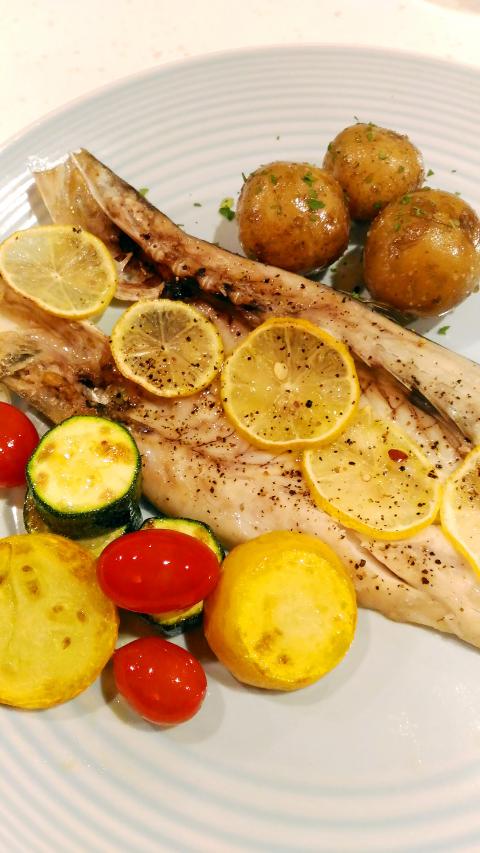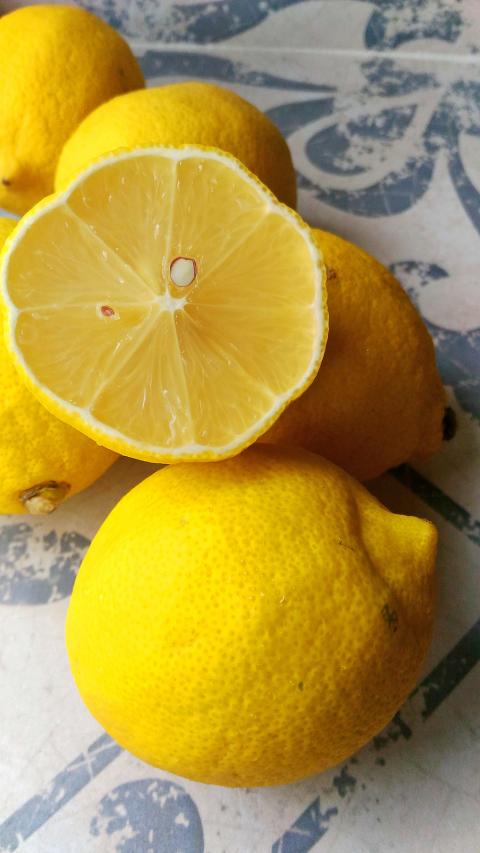Back in October last year, I wrote about lemons (see Taipei Times, Oct. 1, 2016). It is time to revisit the topic in the wake of a burgeoning interest and increased availability of locally grown sweet yellow-skinned lemons on the market. This is a great boon to culinary diversity in Taiwan, as previously such lemons were almost invariably imported. They are the famous Meyer lemons (or something quite like them), which bring a sweet tartness to the flavor palate and their own very specific qualities to the kitchen and dining room.
Sweet yellow lemons have long been available at upscale grocers in Taiwan, but availability has always been uncertain and prices high. For many applications, local green lemons prove a perfectly adequate substitute, and have the advantage of sometimes coming in organic, unwaxed form. But color can be a problem, as green lemons do not heat well and often release sharp, acidic flavors under the grill or turn an unpalatable brown on the oven. These green lemons are usually of the Eureka variety, which work well enough after fully ripening and turning yellow in temperate climates, but in the hot humidity of Taiwan they remain green until a very late stage of growth when they are virtually unfit to eat.
With the buzz surrounding locally grown sweet yellow-skinned lemons, online foodie magazine NOM (nommagazine.com) published an article about Meyer lemons in September explaining the uses of this new and exciting addition to the Taiwanese pantry.

Photo: Ian Bartholomew
Drawing heavily on a related article on the US food Web site thekitchn.com (suggesting that the confusion over lemons, their variety and flavors, is not confined to Taiwan), the article lists only one local organic grower, but sweet yellow-skinned lemons are being grown by a number of small farms around the island. I have found many to be of good quality, ideal for dishes such as the French classic tarte citron. Yet they have a robustness, seen in the thicker skin and less rounded body that is suggestive of some cross with Eureka or other type of lemon.
With reservations, let us call these sweet yellow-skinned lemons Meyer lemons. They are certainly distinct from the usual local product and from the cook’s point of view, that is all that matters. Named after Frank Meyer, an agricultural explorer for the US Department of Agriculture, these sweet lemons were brought back from China in the early 1900s. A cross between the lemon and the mandarin orange, the Meyer was used in China as a decorative houseplant, and was introduced as such into the US.
Although Meyer died in Shanghai in 1918, it was not until the 1960s that the plant was widely cultivated, and then only in the citrus growing regions of California and Florida. Before the 1990s, they were not widely available or even known outside these areas, but according to a 2009 US National Public Radio report, it was celebrity entrepreneur Martha Stewart who brought them into the culinary mainstream. Whatever one might feel about the once disgraced figure, if Stewart really did establish the Meyer lemon as part of our pantry, that is a service to all of us who cook.

Photo: Ian Bartholomew
One of the distinctive characteristics of the Meyer lemon is that the peel is edible. However, this is something I would test out first on any particular batch before serving some lemon peel and tomato salsa to guests. Textures vary, which is why I am happier with the term sweet yellow-skinned lemon, despite the fact that it doesn’t sound particularly attractive.
In a mood for compromises, the local yellow lemons make a fine tarte citron, something that would not really work with the green variety (not that local patisseries have not tried). Khaki specks of zest in a custard just looks ugly and will be unattractive however organic the lemons might be. The sweet yellow-skinned lemon is also ideal with simple grilled fish, as its skin releases a fresh aroma quite different from the acrid bitterness of the green variety under direct heat.
Grilled fish with lemon
Recipe
(Serves 2)
Most fish can be served with lemon, so this is not much of a recipe, and its only merit may be to draw attention to the use of sharpfin barracuda (尖鰭金梭魚), a locally caught fish with excellent flavor.
Green-skinned lemons release an unappealing bitter taste when burnt, but sweet yellow-skinned lemons have a splendid bergamot flavor that really enriches the dish.
With any fish cooking, it is crucial to cultivate a good fishmonger who will tell you the truth about what he, or she, is selling, and pay the premium that a fresh product will inevitably demand. As with most fish, freezing will kill off half the flavor and I will always opt for a trusted fishmonger at a traditional market than any supermarket. Barracuda is currently at its best and caught fresh and put under the grill for just a few minutes, makes for a remarkable dish. Grilling fish is the easiest thing in the world, but over-cooking fish is easier still.
Ingredients
2 medium sized sharpfin barracuda (or any mackerel-like fish), cut open in two fillets or butterflied (you can ask your fishmonger to do this for you)
garlic, minced
olive oil
salt and pepper
1 Meyer lemon, thinly sliced
steamed baby potatoes
zucchini or summer squash, fried briefly in olive oil
Method
1. Preheat the grill to 230c.
2. Season the fish with salt and pepper, rub lightly with minced garlic and olive oil. Set aside for 15 minutes.
3. Place thin slices of Meyer lemon over the fish. Place on a top shelf closest to the grill and cook for 5 minutes. Check for doneness.
4. Serve with steamed baby potatoes smothered in butter and zucchini or summer squash.
Ian Bartholomew runs Ian’s Table, a small guesthouse in Hualien. He has lived in Taiwan for many years writing about the food scene and has decided that until you look at farming, you know nothing about the food you eat. He can be contacted at Hualien202@gmail.com.

US President Donald Trump may have hoped for an impromptu talk with his old friend Kim Jong-un during a recent trip to Asia, but analysts say the increasingly emboldened North Korean despot had few good reasons to join the photo-op. Trump sent repeated overtures to Kim during his barnstorming tour of Asia, saying he was “100 percent” open to a meeting and even bucking decades of US policy by conceding that North Korea was “sort of a nuclear power.” But Pyongyang kept mum on the invitation, instead firing off missiles and sending its foreign minister to Russia and Belarus, with whom it

When Taiwan was battered by storms this summer, the only crumb of comfort I could take was knowing that some advice I’d drafted several weeks earlier had been correct. Regarding the Southern Cross-Island Highway (南橫公路), a spectacular high-elevation route connecting Taiwan’s southwest with the country’s southeast, I’d written: “The precarious existence of this road cannot be overstated; those hoping to drive or ride all the way across should have a backup plan.” As this article was going to press, the middle section of the highway, between Meishankou (梅山口) in Kaohsiung and Siangyang (向陽) in Taitung County, was still closed to outsiders

Many people noticed the flood of pro-China propaganda across a number of venues in recent weeks that looks like a coordinated assault on US Taiwan policy. It does look like an effort intended to influence the US before the meeting between US President Donald Trump and Chinese dictator Xi Jinping (習近平) over the weekend. Jennifer Kavanagh’s piece in the New York Times in September appears to be the opening strike of the current campaign. She followed up last week in the Lowy Interpreter, blaming the US for causing the PRC to escalate in the Philippines and Taiwan, saying that as

The Chinese Communist Party (CCP) has a dystopian, radical and dangerous conception of itself. Few are aware of this very fundamental difference between how they view power and how the rest of the world does. Even those of us who have lived in China sometimes fall back into the trap of viewing it through the lens of the power relationships common throughout the rest of the world, instead of understanding the CCP as it conceives of itself. Broadly speaking, the concepts of the people, race, culture, civilization, nation, government and religion are separate, though often overlapping and intertwined. A government